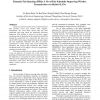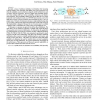8 search results - page 1 / 2 » Short-Term Fairness of 802.11 Networks with Several Hosts |
MWCN
2004
Springer
13 years 10 months ago
2004
Springer
Previously, we have analyzed the short-term fairness of the 802.11 DCF (Distributed Coordination Function) access method in the case of a network with two hosts. In this paper we e...
GLOBECOM
2009
IEEE
14 years 1 hour ago
2009
IEEE
Abstract— Fairness index among competing hosts in communication networks is an important system measurement. Several fairness index measurements have been proposed in the technic...
ISCC
2003
IEEE
13 years 10 months ago
2003
IEEE
Local area network (LAN) will be a hybrid network that includes wired and wireless links together. Nonetheless, the wired hosts always take the most bandwidth and bring about the ...
INFOCOM
2002
IEEE
13 years 10 months ago
2002
IEEE
— Recently, a class of solutions including Core-Stateless Fair Queueing (CSFQ), Rainbow Fair Queueing, and Diffserv have been proposed to address the scalability concerns that ha...
LISA
2000
13 years 6 months ago
2000
Most denial-of-service attacks are characterized by a flood of packets with random, apparently valid source addresses. These addresses are spoofed, created by a malicious program ...


